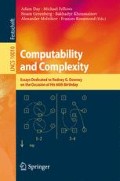Abstract
We review the literature on universal computably enumerable equivalence relations, i.e. the computably enumerable equivalence relations (ceers) which are \(\Sigma ^0_1\)-complete with respect to computable reducibility on equivalence relations. Special attention will be given to the so-called uniformly effectively inseparable (u.e.i.) ceers, i.e. the nontrivial ceers yielding partitions of the natural numbers in which each pair of distinct equivalence classes is effectively inseparable (uniformly in their representatives). The u.e.i. ceers comprise infinitely many isomorphism types. The relation of provable equivalence in Peano Arithmetic plays an important role in the study and classification of the u.e.i. ceers.
Andrews was partially supported by NSF grant DMS-1201338.
Badaev was partially supported by Grant 3952/GF4 of the Science Committee of the Republic of Kazakhstan.
Sorbi is a member of INDAM-GNSAGA; he was partially supported by Grant 3952/GF4 of the Science Committee of the Republic of Kazakhstan, and by PRIN 2012 “Logica Modelli e Insiemi”.
The authors thank Keng Meng Ng for his helpful comments and suggestions. The wish also to thank an anonymous referee for having pointed out several inaccuracies in a previous version of the paper.
Access this chapter
Tax calculation will be finalised at checkout
Purchases are for personal use only
References
Andrews, U., Lempp, S., Miller, J.S., Ng, K.M., San Mauro, L., Sorbi, A.: Universal computably enumerable equivalence relations. J. Symbolic Logic 79(1), 60–88 (2014)
Andrews, U., Sorbi, A.: The complexity of index sets of classes of computably enumerable equivalence relations. J. Symbolic Logic (to appear)
Andrews, U., Sorbi, A.: Jumps of computably enumerable equivalence relations (2016, in preparation)
Badaev, S.: On weakly precomplete positive equivalences. Siberian Math. J. 32, 321–323 (1991)
Badaev, S., Sorbi, A.: Weakly precomplete computably enumerable equivalence relations. Mat. Log. Quart. 62(1–2), 111–127 (2016)
Bernardi, C.: On the relation provable equivalence and on partitions in effectively inseparable sets. Studia Logica 40, 29–37 (1981)
Bernardi, C., Montagna, F.: Equivalence relations induced by extensional formulae: classifications by means of a new fixed point property. Fund. Math. 124, 221–232 (1984)
Bernardi, C., Sorbi, A.: Classifying positive equivalence relations. J. Symbolic Logic 48(3), 529–538 (1983)
Cleave, J.P.: Creative functions. Z. Math. Logik Grundlag. Math. 7, 205–212 (1961)
Cooper, S.B.: Computability Theory. Chapman & Hall/CRC Mathematics, Boca Raton, London, New York, Washington, DC (2003)
Coskey, S., Hamkins, J.D., Miller, R.: The hierarchy of equivalence relations on the natural numbers. Computability 1, 15–38 (2012)
Ershov, Y.L.: Positive equivalences. Algebra Logic 10(6), 378–394 (1973)
Ershov, Y.L.: Theorie der Numerierungen I. Z. Math. Logik Grundlag. Math. 19, 289–388 (1973)
Ershov, Y.L.: Theorie der Numerierungen II. Z. Math. Logik Grundlag. Math. 19, 473–584 (1975)
Fokina, E., Khoussainov, B., Semukhin, P., Turetsky, D.: Linear orders realized by c.e. equivalence relations. J. Symbolic Logic (to appear)
Fokina, E., Friedman, S., Nies, A.: Equivalence relations that are \(\Sigma ^0_3\) complete for computable reducibility. In: Ong, L., Queiroz, R. (eds.) WoLLIC 2012. LNCS, vol. 7456, pp. 26–33. Springer Berlin Heidelberg, Berlin, Heidelberg (2012). doi:10.1007/978-3-642-32621-9_2
Fokina, E.B., Friedman, S.D., Harizanov, V., Knight, J.F., McCoy, C., Montalbán, A.: Isomorphism relations on computable structures. J. Symbolic Logic 77(1), 122–132 (2012)
Friedman, H.: Proof-theoretic degrees (Unpublished)
Gao, S., Gerdes, P.: Computably enumerable equivalence realations. Studia Logica 67, 27–59 (2001)
Gravuskin, A., Jain, S., Khoussainov, A., Stephan, F.: Graphs realized by r.e. equivalence relations. Ann. Pure Appl. Logic 165(7–8), 1263–1290 (2014)
Gravuskin, A., Khoussainov, A., Stephan, F.: Reducibilities among equivalence relations induced by recursively enumerable structures. Theoret. Comput. Sci. 612(25), 137–152 (2016)
Lachlan, A.H.: A note on positive equivalence relations. Z. Math. Logik Grundlag. Math. 33, 43–46 (1987)
Mal’tsev, A.I.: Sets with complete numberings. Algebra i Logika 2(2), 4–29 (1963)
Miller III, C.F.: On Group-Theoretic Decision Problems and Their Classification. Annals of Mathematics Studies. Princeton University Press, Princeton (1971)
Montagna, F.: Relative precomplete numerations and arithmetic. J. Philos. Logic 11, 419–430 (1982)
Myhill, J.: Creative sets. Z. Math. Logik Grundlag. Math. 1, 97–108 (1955)
Nies, A., Sorbi, A.: Calibrating word problems of groups via the complexity of equivalence relations. Math. Structures Comput. Sci. (2016, to apper)
Rogers Jr., H.: Theory of Recursive Functions and Effective Computability. McGraw-Hill, New York (1967)
Shavrukov, V.Y.: Remarks on uniformly finitely positive equivalences. Math. Log. Quart. 42, 67–82 (1996)
Smullyan, R.: Theory of Formal Systems. Annals of Mathematical Studies, vol. 47. Princeton University Press, Princeton (1961)
Soare, R.I.: Recursively Enumerable Sets and Degrees. Perspectives in Mathematical Logic, Omega Series. Springer, Heidelberg (1987)
Visser, A.: Numerations, \(\lambda \)-calculus & arithmetic. In: Seldin, J.P., Hindley, J.R. (eds.) To H. B. Curry: Essays on Combinatory Logic, Lambda Calculus and Formalism, pp. 259–284. Academic Press, London (1980)
Author information
Authors and Affiliations
Corresponding author
Editor information
Editors and Affiliations
Rights and permissions
Copyright information
© 2017 Springer International Publishing AG
About this chapter
Cite this chapter
Andrews, U., Badaev, S., Sorbi, A. (2017). A Survey on Universal Computably Enumerable Equivalence Relations. In: Day, A., Fellows, M., Greenberg, N., Khoussainov, B., Melnikov, A., Rosamond, F. (eds) Computability and Complexity. Lecture Notes in Computer Science(), vol 10010. Springer, Cham. https://doi.org/10.1007/978-3-319-50062-1_25
Download citation
DOI: https://doi.org/10.1007/978-3-319-50062-1_25
Published:
Publisher Name: Springer, Cham
Print ISBN: 978-3-319-50061-4
Online ISBN: 978-3-319-50062-1
eBook Packages: Computer ScienceComputer Science (R0)

